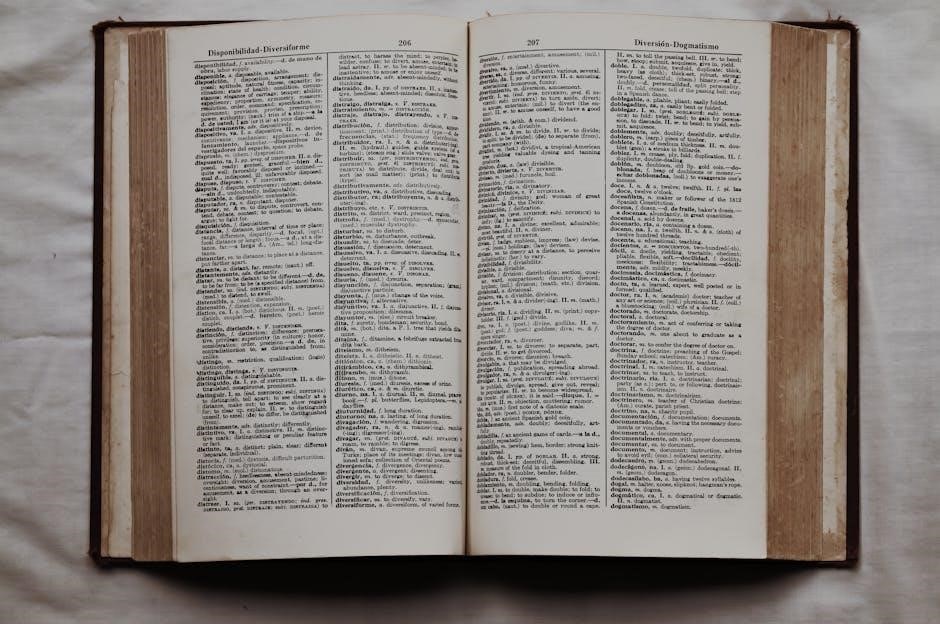Vedic literature, comprising ancient Indian texts, forms the foundation of Hindu philosophy and culture. These sacred writings include the Vedas, Upanishads, and Brahmanas, offering timeless wisdom. Available in English PDFs, they provide accessible insights into spirituality, rituals, and universal truths, bridging tradition with modern understanding.
Overview of Vedic Literature
Vedic literature encompasses ancient Indian texts that form the cornerstone of Hinduism and Indian culture. The primary texts include the Vedas, Upanishads, and Brahmanas, each serving distinct purposes. The Vedas are divided into four categories: Rigveda, Yajurveda, Samaveda, and Atharvaveda, focusing on knowledge, rituals, melodies, and spells, respectively. These writings are rich in spiritual wisdom, philosophical debates, and guidelines for living a harmonious life. Composed in Sanskrit, they have been preserved and passed down through generations, influencing various aspects of Indian society. In modern times, English translations and PDF formats have made these ancient texts accessible globally, allowing readers to explore their teachings without language barriers. This accessibility has sparked interest among scholars and spiritual seekers worldwide, bridging the gap between tradition and contemporary understanding.
Significance of Vedic Literature in Modern Times
Vedic literature holds profound relevance in modern times due to its timeless wisdom and universal truths. It provides insights into spirituality, ethics, and holistic living, addressing contemporary challenges like stress and environmental degradation. The teachings emphasize self-realization, mindfulness, and harmony with nature, resonating with global movements toward sustainability and mental well-being. English translations and PDF resources have made these ancient texts accessible to a broader audience, allowing people to explore their teachings without language barriers. This accessibility has led to a growing interest in Vedic philosophy among scholars and spiritual seekers worldwide. By studying Vedic literature, individuals can gain a deeper understanding of life’s purpose and cultivate a balanced, meaningful existence in today’s fast-paced world.

The Four Vedas: A Comprehensive Guide
The four Vedas—Rigveda, Yajurveda, Samaveda, and Atharvaveda—form the core of Vedic literature, offering diverse insights into rituals, hymns, and spiritual wisdom essential for understanding ancient Indian traditions.
Rigveda: The Veda of Knowledge
The Rigveda, the oldest and most revered of the Vedas, is a collection of over 1,000 suktas (hymns) divided into 10 mandalas (books). Composed in Sanskrit, it contains profound spiritual and philosophical insights, praising deities like Agni, Indra, and Varuna. Its verses explore the nature of the universe, cosmic order, and human existence, making it a cornerstone of Vedic knowledge.
As the “Veda of Knowledge,” the Rigveda is not only a religious text but also a literary masterpiece, influencing later Vedic and Hindu traditions. English translations of the Rigveda, available in PDF formats, provide accessible interpretations of its complex Sanskrit verses, enabling modern readers to delve into its timeless wisdom and cultural significance.

Yajurveda: The Veda of Rituals
The Yajurveda, known as the “Veda of Rituals,” focuses on procedural aspects of Vedic ceremonies and sacrifices. It contains mantras and instructions for priests, detailing rituals, offerings, and sacred practices. Divided into two main schools—Shukla (White) and Krishna (Black) Yajurveda—it emphasizes the practical application of Vedic knowledge.
English translations of the Yajurveda in PDF formats have made its ancient wisdom accessible to global audiences. These texts provide insights into the structure and significance of rituals, bridging the gap between traditional practices and modern understanding. The Yajurveda remains a vital resource for studying Vedic spirituality and its cultural heritage.
Samaveda: The Veda of Melodies
The Samaveda, often referred to as the “Veda of Melodies,” is a collection of sacred hymns and chants. It primarily consists of musical compositions, many of which are derived from the Rigveda, adapted for ritualistic singing. These melodies are integral to Vedic ceremonies, particularly the Soma rituals, and are meant to be sung by trained priests.
English translations of the Samaveda in PDF format have made its musical and spiritual essence accessible to a broader audience. These texts provide insights into the cultural and ritual significance of the Samaveda, highlighting its role in preserving ancient Indian musical traditions. By studying these PDF resources, readers can explore the harmony between sound, spirituality, and Vedic practices.
Atharvaveda: The Veda of Spells and Hymns
The Atharvaveda, often regarded as the “Veda of Spells and Hymns,” is a unique collection of magical formulas, incantations, and rituals. It differs from other Vedas by focusing on practical applications, such as healing, protection, and warding off evil. This Veda contains spells for various purposes, including health, prosperity, and spiritual growth, making it a vital text for understanding ancient Indian magical and ritualistic practices.

English translations of the Atharvaveda in PDF format have made this ancient wisdom accessible to modern readers. These texts preserve the original essence while offering insights into the cultural and spiritual significance of its spells and hymns. Studying the Atharvaveda through these resources provides a deeper understanding of its role in Vedic tradition and its relevance in contemporary times.

Vedic Literature in English: Translations and Resources
Vedic texts in English provide accessible gateways to ancient wisdom, offering translations that preserve authenticity while facilitating modern understanding. These resources are invaluable for global readers seeking spiritual insights and cultural enrichment.

Importance of English Translations
English translations of Vedic literature have bridged cultural and linguistic gaps, making ancient wisdom accessible to a global audience. These translations preserve the essence of the original texts while adapting to modern readability, ensuring their relevance in contemporary times. They enable non-Sanskrit speakers to explore Vedic philosophy, rituals, and spirituality, fostering a deeper understanding of India’s heritage. Moreover, English translations facilitate academic and personal studies, aiding scholars and enthusiasts alike. They also play a crucial role in educating future generations about the timeless values and knowledge embedded in Vedic texts. By making these sacred works widely available, English translations contribute to the global appreciation and preservation of Vedic culture.
Popular English Translations of Vedic Texts

Several renowned English translations of Vedic texts have gained acclaim for their accuracy and accessibility. The Rigveda translated by Ralph Griffith and The Yajurveda by Devi Chand remain influential. Max Müller’s translations, part of the Sacred Books of the East series, are highly regarded. The Samaveda by Charles Whish and Atharvaveda by Maurice Bloomfield are also notable. These translations have made Vedic wisdom accessible to English-speaking audiences, preserving the original meaning while ensuring readability. Additionally, modern translators like Swami Prabhavananda and Eknath Easwaran have contributed insightful interpretations, blending traditional knowledge with contemporary understanding. These works are invaluable resources for both scholars and spiritual seekers, offering a gateway to explore Vedic teachings in depth.

Accessing Vedic Literature in English PDF Format
Vedic literature in English PDFs is easily accessible through various online platforms and websites, offering convenient access to ancient texts for modern readers and scholars alike.
Overview of PDF Resources
Vedic literature in English PDFs offers a comprehensive collection of ancient texts, including the Vedas, Upanishads, and Brahmanas. These resources provide accessible versions of sacred writings, perfect for scholars and enthusiasts alike. Many PDFs feature detailed commentaries and translations by renowned scholars, ensuring clarity and depth. They often include original Sanskrit texts alongside English interpretations, making them invaluable for comparative studies. Popular translations by scholars like Max Müller and Swami Prabhavananda are widely available in PDF formats. These digital resources are easily searchable, making it simpler to explore specific verses or themes. Additionally, PDFs often include introductory essays, historical context, and philosophical insights, enhancing understanding. Overall, Vedic literature in English PDFs is a convenient and enriching way to engage with India’s spiritual and cultural heritage in the modern digital age.
Popular Websites and Platforms for Download
Several reputable websites and platforms offer Vedic literature in English PDF formats for free download. Sacred-Texts.com is a trusted source, providing a vast archive of Vedic texts, including translations by scholars like Max Müller. HolyBooks.com is another popular platform, offering a wide range of Vedic scriptures and commentaries in downloadable PDFs. Additionally, archive.org hosts numerous public domain works, including English translations of the Vedas and Upanishads. Platforms like Academia.edu and ResearchGate also feature scholarly articles and resources on Vedic literature. These websites ensure easy access to ancient wisdom, catering to both casual readers and serious researchers. By visiting these sites, one can explore the rich tapestry of Vedic knowledge in a convenient digital format.
How to Download and Use Vedic Literature PDFs
Downloading Vedic literature in English PDF format is straightforward. Visit reputable websites like Sacred-Texts.com or HolyBooks.com, which offer free downloads. Use the search bar to find specific texts, such as the Rigveda or Upanishads, and click the download button. Ensure your device has a PDF reader installed, such as Adobe Acrobat or Foxit Reader, to open the files. After downloading, organize the PDFs in a dedicated folder for easy access. To enhance your study, use features like bookmarks, highlights, and notes within your PDF reader. For a deeper understanding, pair the texts with commentaries or study guides. Always respect copyright laws and use the material responsibly. By following these steps, you can effectively explore and utilize Vedic literature in digital form.
Vedic literature in English PDFs offers timeless insights into spirituality and wisdom; Embrace these texts for spiritual growth, self-reflection, and a deeper understanding of ancient Indian philosophy.

Final Thoughts on Studying Vedic Literature
Studying Vedic literature in English PDFs offers a profound journey into ancient wisdom, blending spirituality, philosophy, and practical life lessons. These texts provide insights into universal truths, ethical living, and self-awareness, making them relevant for personal growth and intellectual exploration. The accessibility of Vedic texts in English ensures that their timeless teachings reach a global audience, fostering cross-cultural understanding and spiritual enrichment. Embracing these texts can lead to a deeper connection with oneself and the world, encouraging a holistic approach to life. Whether for academic interest or personal enlightenment, Vedic literature remains a valuable resource for anyone seeking knowledge and inner peace in today’s fast-paced world.
Encouragement for Further Exploration

Exploring Vedic literature in English PDFs is a rewarding journey that offers insights into ancient wisdom, spirituality, and philosophy. These texts are not just historical relics but living sources of knowledge that continue to inspire personal growth and intellectual enrichment. By delving into these resources, readers can gain a deeper understanding of universal truths, ethical living, and the interconnectedness of all existence. The accessibility of Vedic texts in English PDFs makes it easier than ever to embark on this transformative journey. Whether you’re seeking spiritual guidance, philosophical clarity, or cultural enrichment, Vedic literature provides a wealth of inspiration and wisdom. Embrace this opportunity to explore these timeless teachings and uncover their relevance in modern life.
